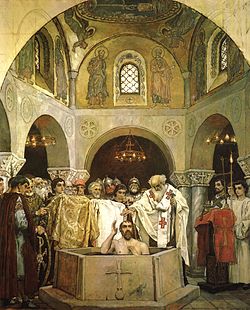In his annual Address to the Federal Assembly in Moscow yesterday, Russian president Vladimir Putin justified his takeover of Crimea on religious grounds. This was, he said, the baptismal place of Prince Vladimir, the ruler who brought about the conversion of the Russian people:
Christianity was a powerful spiritual unifying force that helped involve various tribes and tribal unions of the vast Eastern Slavic world in the creation of a Russian nation and Russian state. It was thanks to this spiritual unity that our forefathers for the first time and forevermore saw themselves as a united nation. All of this allows us to say that Crimea, the ancient Korsun or Chersonesus, and Sevastopol have invaluable civilisational and even sacral importance for Russia, like the Temple Mount in Jerusalem for the followers of Islam and Judaism.
Nor was this the first time that Putin has referred to Crimea in such terms. In a meeting with Russian historians last month he called it ”a sacred space,” declaring, “In Crimea in Chersonesus Prince Vladimir was baptized, and then he converted Russia. The original baptismal font of Russia is there.”
Well, maybe it is and maybe it isn’t. The story of Vladimir’s baptism in the Black Sea port of Kherson in 989, as told by the Russian Primary Chronicle, includes such fantastic details as that the baptismal waters cured him of temporary blindness. Historians now regard it as less plausible than the biographical account that has Vladimir getting baptized in Kiev a couple of years earlier.
To be sure, even if Vladimir was baptized in Crimea, that wouldn’t make it the equivalent of the Temple Mount. For Jews, it would be more like Ur of the Chaldees in Mesopotamia, where Abraham first encountered God, or perhaps Mt. Sinai, where Moses received the Ten Commandments and God appeared to the Israelites — neither of which are sacred spaces that need to be occupied.
However, there are historical circumstances that may explain why the story of Prince Vladimir in Kherson so appeals to Putin. For if the prince’s conversion there is unlikely, the evidence for his presence is solid.
It seems that the Byzantine emperor, Basil II, was about to be deposed by an upstart general when Vladimir came to rescue with 6,000 troops. On the way home, he decided — for reasons that are debated — to capture Kherson. In other words, what Putin’s namesake was doing in Crimea in 989 was conquering it.
Exactly 1,000 years later, the Soviet Union fell apart and Ukraine became an independent state, taking Crimea with it. And now a new Vladimir has taken it back.
For the record, the aboriginal sacred space of Russian Christendom is Kiev. Let’s hope Putin doesn’t start talking about that.






